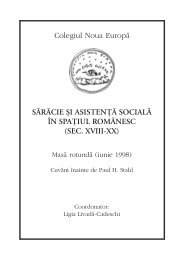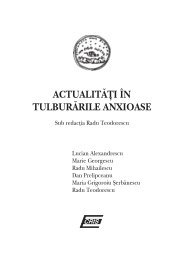New Europe College Regional Program Yearbook 2001-2002
New Europe College Regional Program Yearbook 2001-2002
New Europe College Regional Program Yearbook 2001-2002
You also want an ePaper? Increase the reach of your titles
YUMPU automatically turns print PDFs into web optimized ePapers that Google loves.
TAMARA CÃRÃUª<br />
Paul Corescu, C. Capverde, G. Sfichi, Polirom 2000, chapter “Language of<br />
the Right, Language of the Left”.<br />
108 For example, Joshua A. Fishman maintains that community of language is<br />
perceived as the main marker of primordial ties, or like “bone of their bone,<br />
flesh of their flesh and blood of their blood”, Joshua A. Fishman, “Social<br />
Theory and Ethnography: Language and Ethnicity in Eastern <strong>Europe</strong>”, in<br />
Nationalism, Critical Concepts in Political Science, ed. by J. Hutchinson and<br />
A. Smith, Routledge, 2000, vol. I., pp. 200-215. p. 208.<br />
109 Vitalie Ciobanu, op. cit.<br />
110 According to Brendan O’Leary, the apolitical character of Gellner’s theory<br />
can be substantiated in several ways: i. His typology is geared towards<br />
explaining the development in the thwarting of nationalist secessionism, but<br />
does not provide a politically sensitive account of what may dampen<br />
nationalist secessionism. ii. The theory appears to rely on culturally or<br />
materially reductionist accounts of political motivation. iii. Gellner neglects<br />
the role of power politics in explaining which cultures become nations and<br />
the possibility that nation-builders explicitly see the functional relationship<br />
between nationalism and modernity which he posits. iv. Although Gellner<br />
sees the connections between nationalism and egalitarianism in modern<br />
societies, curiously he does not see the mutually reinforcing relationship<br />
between nationalism, egalitarianism and democratization; v. he displays<br />
contempt for nationalist doctrines; Brendan O’Leary, op. cit., p. 63.<br />
111 Op. cit., p. 65.<br />
112 Op. cit., p. 65.<br />
113 In Nationalism (1997), Gellner takes account of politics and makes political<br />
prescriptions. Brendan O’Leary considers that Gellner “describes this<br />
prescription as banal, perhaps because he may have been conscious of<br />
how far they support the conventional wisdom of Euro-liberals”, op. cit., p.<br />
75.<br />
114 Liah Greenfeld, Nationalism: Five Roads to Modernity, Cambridge. Mass.;<br />
Harvard University Press, p. 565.<br />
115 Maurizio Viroli, op. cit, pp. 140-161.<br />
116 Op. cit., p. 176.<br />
117 Communitarians like Michael Sandel, Michael Walzer, Charles Taylor,<br />
Aldsair MacIntire.<br />
118 Walker Connor considers the main result of the improper analogizing from<br />
experience of the United States to be the presupposition that the history of<br />
acculturation and assimilation within an immigrant society would be suitable<br />
for repetition in multinational states, op. cit., p. 69.<br />
119 “Many post-war liberals thought that religious tolerance, based on the<br />
separation of church and state, provides a model for dealing with ethnocultural<br />
difference as well. In this view, ethnic identity, like religion, is<br />
something which people should be free to express in their private lives, and<br />
69







